Sports and travel both have the potential to unite a common passion in people.
Dhani Jones, NFL player, host of Dhani Tackles the Globe, and author of The Sportsman: Unexpected Lessons from an Around-the-World Sports Odyssey, joins Peter to share how sports and travel have changed his life.
Peter Greenberg: I can go toe to toe with top defensive linebacker Dhani Jones any day. No, not on the football field, but in terms of our passports. I first discovered Dhani Jones on the NFL gridiron, but I then discovered a whole new side of him on the Travel Channel. Most people don’t realize your history, but you’ve been traveling since you were a baby, right?
Dhani Jones: When you have military parents, you automatically step into the world of travel. You are born into it depending upon where your parents are stationed and where you move to. We were located in Japan in Okinawa, so we moved all throughout Southeast Asia. And that translated into my love of travel. I went to school in Michigan and during breaks my mother would send me to different places.
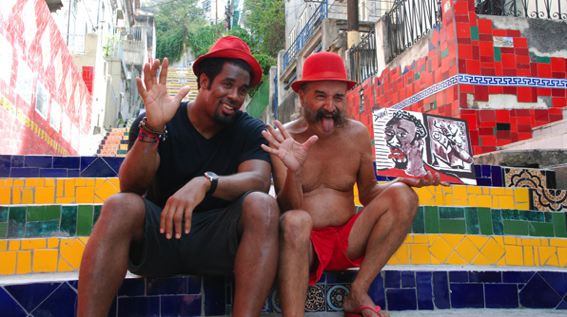
Dhani Jones in Brazil - photo via Travel Channel
She would give me open tickets, so I’d go to the Caribbean or to Europe. I didn’t necessarily have the same spring break opportunities as other people, so I had a different thought process. I thought, well, I’m not going to go to Cancun; I’m going to go to Martinique. I’m not going to go down to Miami; I’m going to go to London.
I wanted to different places because there are different things I wanted to experience. Peter, you know as well as I do, that when you travel and experience life outside of the United States and in new cultures, your whole life changes.
PG: What’s really cool about your travel experience, Dhani, is that you learned it from such an early age. You gained a degree of self-sufficiency when you travel that most American travelers don’t have.
DJ: You have to be able to travel. You have to be able to know what you’re doing. You have to be able to acclimatize to different circumstances. You have to be able to deal with people. You have to be able to understand where you are.
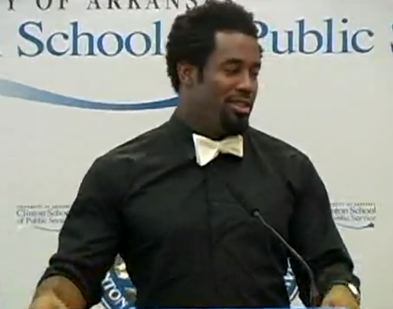
Dhani Jones Wearing Bowtie - photo via https://bowtiecause.org/
The one major thing you have to do when you travel is to erase those preconceived thoughts. You have to erase those ideas. You have to erase what I call prejudgments, if you will, and become a blank canvas, as we talk about with the Bow Tie Cause. You have to start anew and let everybody else teach you about their country. At the end of a trip then you can decide what is going to stick or what’s not going to stick. And then you can come away with your own sort of proper opinion of where you’ve been.
PG: You mentioned the Bow Tie Cause in passing, can you explain what it is?
DJ: Bow ties are for life. Bow ties are for life just like travel is for life. Bow Tie Cause is an organization I started to help support my friend who had non-Hodgkin lymphoma. Kunta Littlejohn said if you want to be anybody you got to rock the bow tie. As they purchase a bow tie for a specific cause, they can tell this story about the non-profits that they support, the people that they care about and the families that will remain in their hearts.
It’s the same thing with travel. As you travel you’re able to tell stories. As you wear bow ties you are able to tell stories. The most important thing in life is telling stories and starting real conversations.
Experience the stories: Cultural Travel section
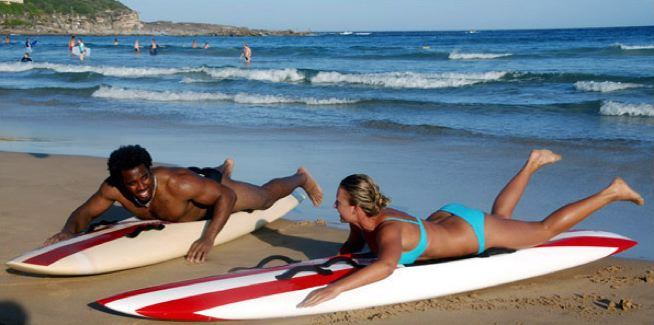
Dhani Surfs Australia - photo via Travel Channel
PG:That is so near and dear to me. I think we’ve lost the art of conversation in this country.
DJ: Use your voice. It resonates. People remember. If you engage and have proper conversations, that’s when you’re going to learn about someone. You’re going to take away their stories and experiences and apply them to your own life. Conversations dance back and forth and you can realize where the connections between two people lie.
PG: You said earlier that it’s only when you get to a certain place that you get to change your perceptions. Give me an example of a trip where you anticipated one thing, but all of a sudden your expectations got turned upside down.
DJ: I thought that when you travel to Africa as an African-American that the Africans won’t like you and that there is some dissension between the two groups of people. In actuality, I landed in Senegal and was welcomed with outstretched arms. To this day, some of my best friends live in Senegal. And it took that trip to change those ideas in my head. Prejudgments turn people off from traveling. You have to go see for yourself.
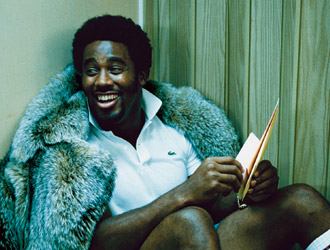
Dhani Jones, World Traveler via Dhanijones.tv
PG: I see you as a traveler who also happens to hit hard on the field. Is that how you would describe yourself?
DJ: That works quite well. Weirdly, travel has provided me with the opportunity to become better at my own sport. I did this show Dhani Tackles the Globe where I played jai alai in Spain, rugby in London, sambo in Russia, muay thai and pradel serey in Thailand and Cambodia, respectively. Playing all these sports allowed me to become a better athlete because cross-training is phenomenal. It gave me extra stamina.
All these different sports that I talk about through my book, The Sportsman, and that I learned in the show, Dhani Travels the Globe, provided me the opportunity to travel. Travel was before sports. And then there was sports. And then there was travel with sport. And that travel with sport ultimately allowed me to play the game at a higher level.
PG: We talked about your experiences in Dakar, can you give me another example of a place that defied your expectations?
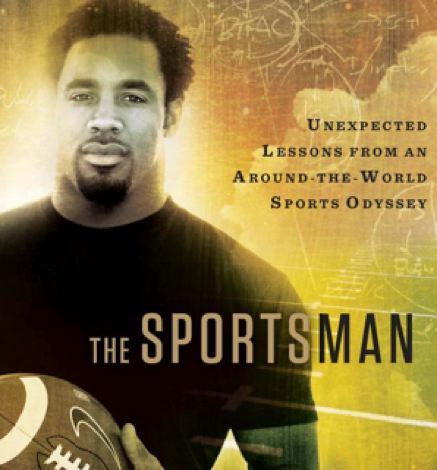
The cover of Dhani Jones' book The Sportsman
DJ:Switzerland, I thought there would be some people that looked like me, but I couldn’t find anybody. As you travel you start to recognize that everybody may look a little different and you may not find people that look like you, but in essence everybody wants to learn. And if you can kind of learn to get past all these mental blocks, and these assumptions we talked about before hand, you can come into an experience unlike anything else.
Peter, you’ve been to more countries than I have and I’m just trying to catch up to you. I’m trying to live my life like you, because travel is that important. I’m trying to bring travel to a group of people that maybe haven’t had the opportunity to travel, or don’t think they can travel. You can live vicariously through me if you can’t get your own passport and see life for yourself.
PG: It’s interesting that you say that because it really is it about accessibility.
DJ: We’ve got to get the world to travel. There’s so many different things happening within the world today. I’m not trying to get into politics or governmental affairs. I don’t want to enter into these debates, but a lot of the things you read in the paper you have to go see for yourself. A lot of things that people write you have to go see for yourself. You have to ask the hard questions to the people that are living it.
PJ: So have you been able to drag your fellow NFL players with you to show them the world?
DJ: So when I first got into the league I didn’t hear about any guys wanting to travel. I didn’t hear about guys wanting to sort of step outside the sort of “comfort zone” of the game of football. Everyone seemed to just stay within the great walls of the United States. I haven’t been able to take anybody with me on my trips, but I have heard an increased number of players travel. Larry Fitzgerald, a receiver for the Cardinals, travels quite a bit and every off-season he visits like six countries. Kerry Rhodes spends his time over in Europe. Jesse Palmer, a former player and ESPN analyst, spends his whole summer in Europe. Keith Rivers, who plays with me in Cincinnati, travels as well.
PG: You’ve become a role model. I’ll be yodeling with you in Switzerland next.
By Peter Greenberg for Peter Greenberg Worldwide Radio.
Related links on PeterGreenberg.com:












